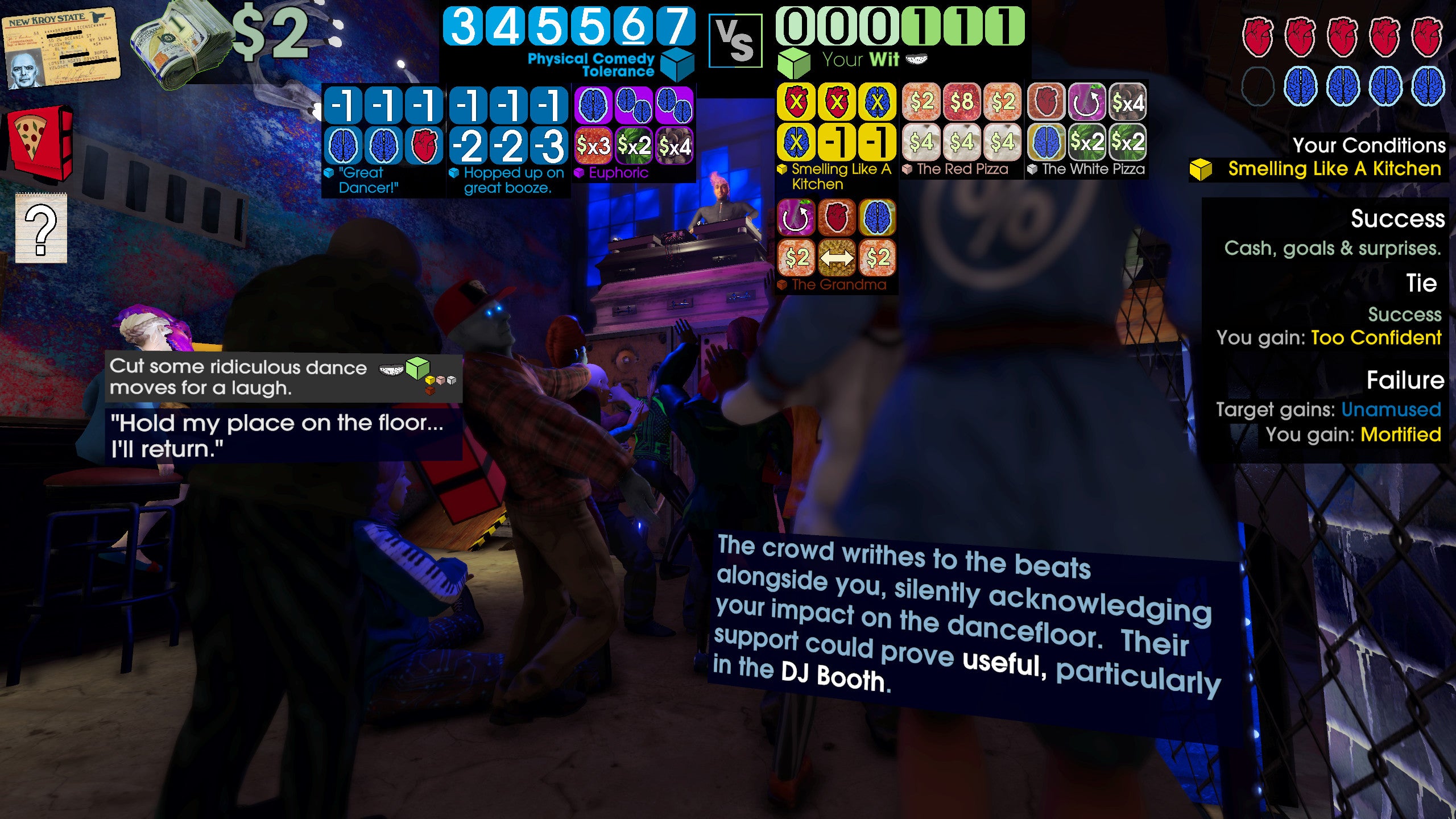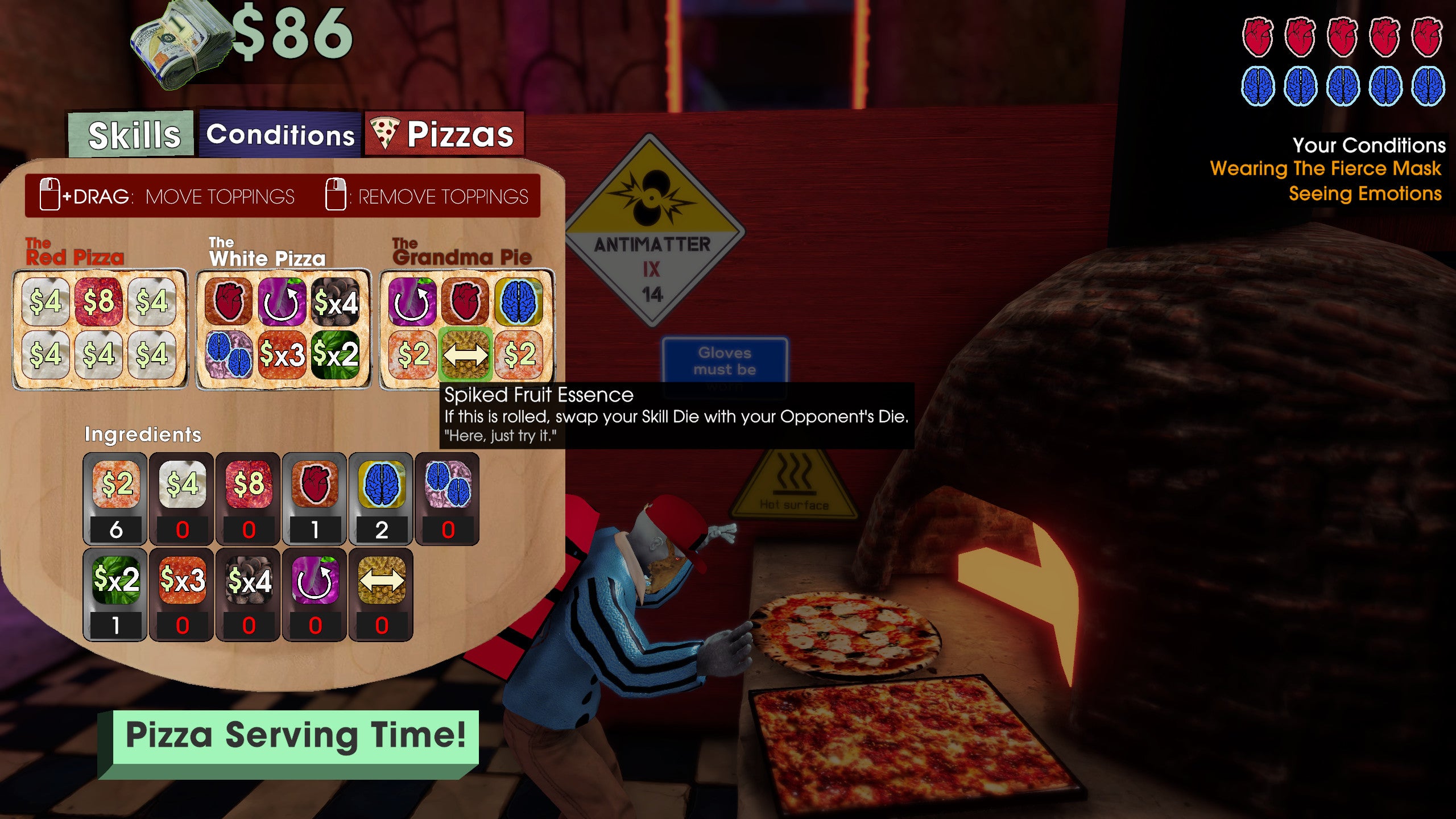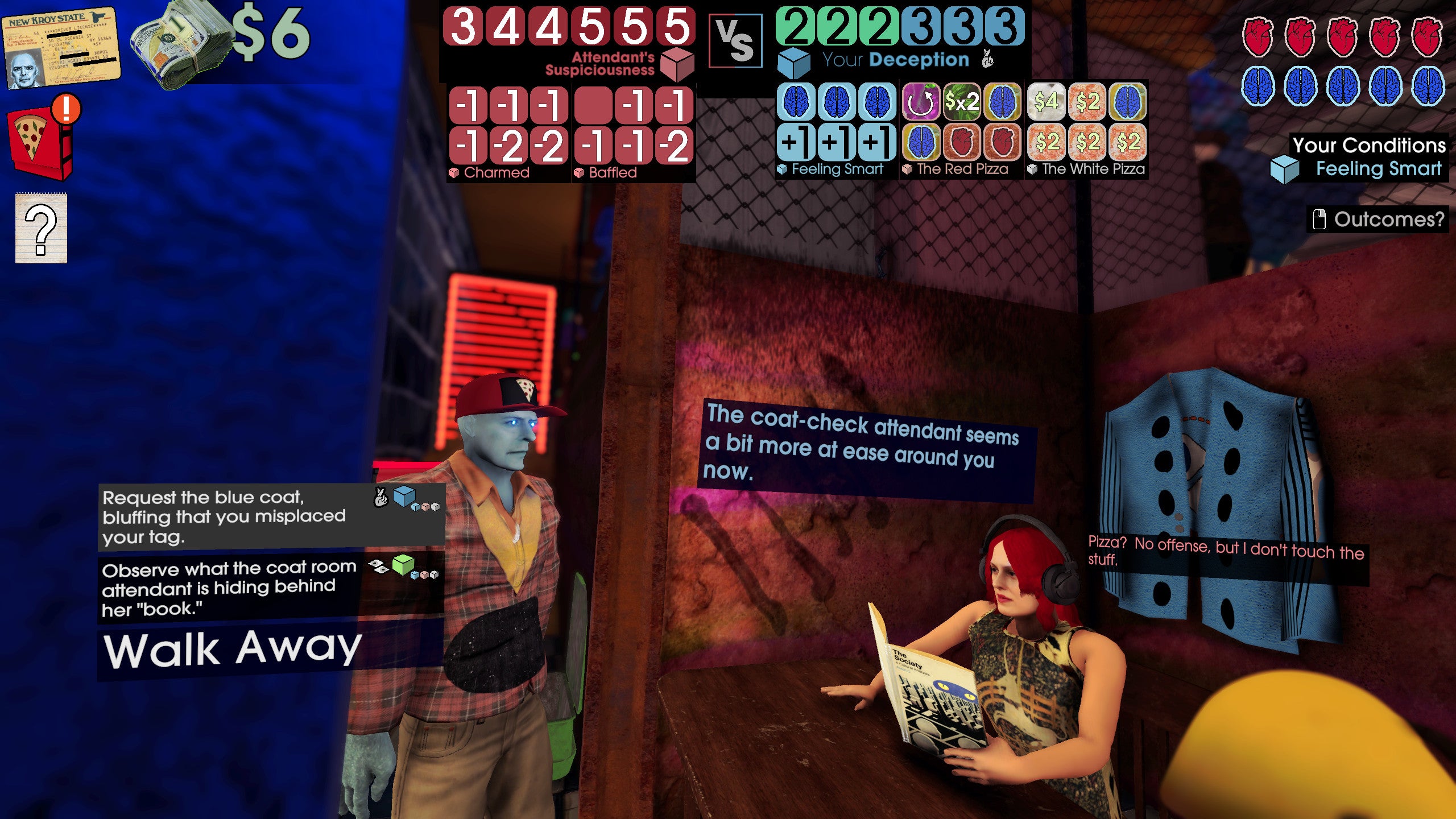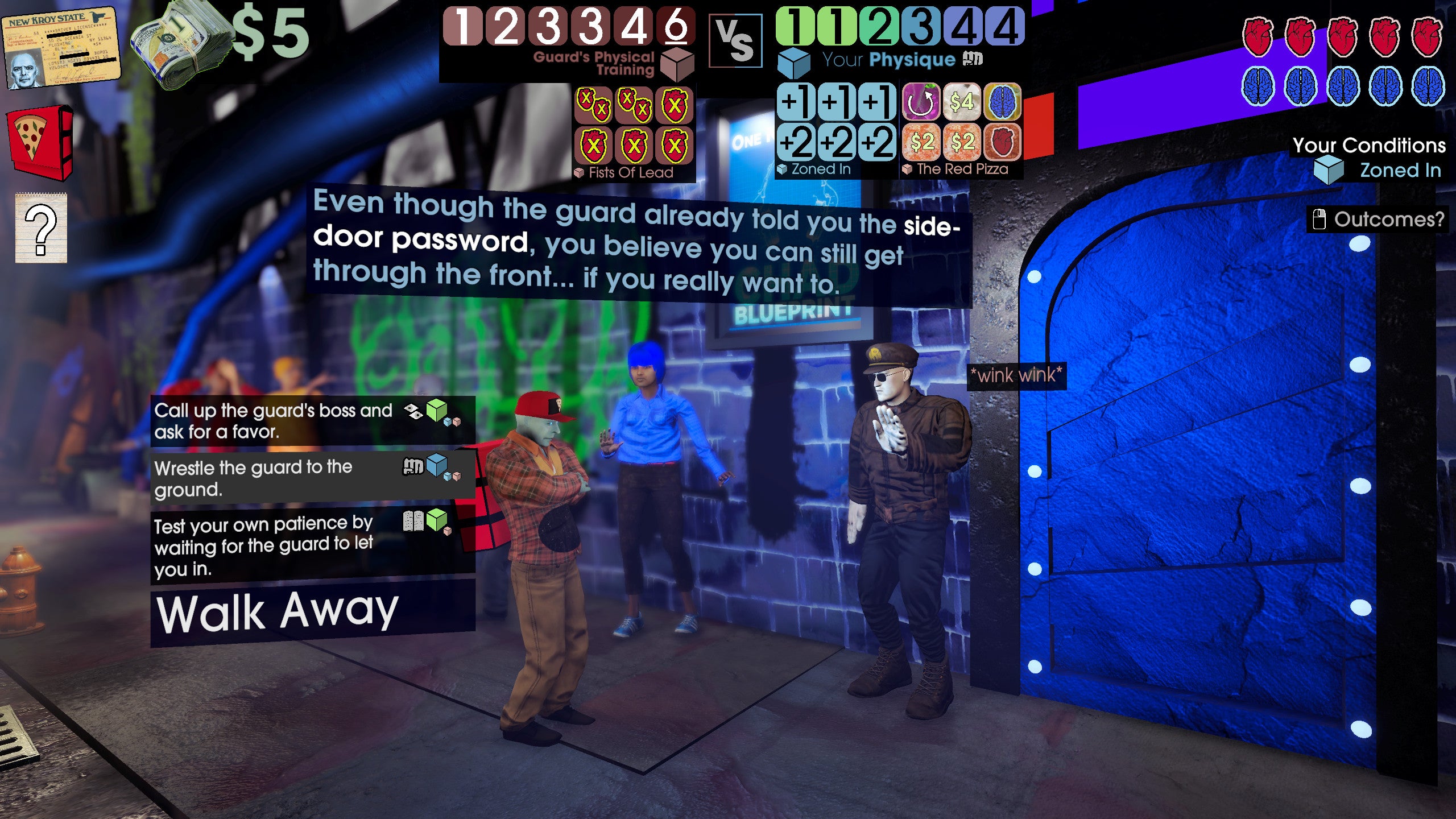I’m always glad to return to Off-Peak City, a strange place of giant statues and dancing skyscrapers, where obsessions are worn openly and shadowy conspiracy is around every corner (and sometimes the corner building itself has a giant face to chat with). While (mostly) solo dev Cosmo D has so far taken us there with first-person explore-o-gawpers and gentle adventure games, this time he’s made a third-person RPG. Inspired by indie zine RPGs, it’s more a one-shot adventure than a sprawling campaign. I’d love to see more CRPGs this size. Betrayal At Club Low has a simple setup: going undercover as a pizzaiolo, get into Club Low, find the compromised agent, and get him out. You can see your man almost from the start, sitting cosy with the big boss and his beefy guards, but it’ll take effort to gain access to him—and a fair bit more to achieve a clean getaway. All in all, my first effort took just over two hours. I wish more RPGs were this length. I poked around, undercovered some mysteries, did some weird stuff, made a lot of friends, made my escape attempt, and came away delighted. With the problem clear from the start, Betrayal At Club Low is about preparing yourself for the getaway attempt. You can take an early crack at it if you’re feeling daring, but it’ll all go easier if you make allies and scope out your options. This might see you impressing the dancefloor with hot moves, ousting a chef to take over her flamingo stew, hotwiring a car, merging your consciousness with the security system, punching a laser grid into submission, gaining and betraying trust, and drinking from a puddle. This all sounds weird out of context but, like all Cosmo D’s games, feels perfectly natural in this absurd world. I adore how people display their obsessions so plainly, like the security guard who sits watching the tennis on his monitors, next to a giant crate of tennis balls. I like the unreal and often grotesque look to characters, whose stock animations and synchronised poses are a great kick of theatre and melodrama. It commits so fully that nothing is weird or out of place, it just feels like itself. And once again, Cosmo D’s excellent music courses through it all (also available on Bandcamp). So far, so Cosmo D. What’s so good this time is that he’s built an interesting system of rules and opportunities atop that mood. Betrayal At Club Low runs on six-sided dice. Different decisions and actions are tested against one of your seven skills (Cooking, Deception, Music, Observation, Physique, Wisdom, and Wit) and you have seven dice to reflect each. These dice start with three 0 faces and three 1 faces. From there, you can pay money (functionally XP) to bump individual dice faces up to higher numbers to improve your odds. You can bend the odds further with two opportunities on each test to reroll as many of your dice as you wish, and by throwing so many extra dice alongside your skill. You find customisable pizza dice, for starters. Different toppings discovered around Club Low (by, say, rummaging in bins or pickpocketing the sound engineer) act as perks, which can be baked onto a dice face. Some topping faces restore your Energy or Nerve (functionally two HP bars), others earn you cash, and some have fancy effects like rerolling the opposing dice or even swapping it for yours. I enjoyed optimising my pizzas, trying many combinations before settling on one money-making dish and two balancing utility ingredients. On top of that, as you succeed or screw up rolls, you’ll gain temporary Condition dice. Rolled alongside your skill and pizza dice, these are manifestations of buffs or debuffs (or both) which might linger for a few rolls. Positive conditions like Clever or Inspired might add bonus numbers to your roll, or restore your Energy or Nerve (two types of HP, basically), while negative conditions like Embarrassed and Feeling Guilty can do the opposite. Some Condition dice have both positive and negative faces. I enjoyed carefully picking my next step to work with my Conditions, learning to burn off negative dice in easy challenges then earning positive ones before tackling tasks that would otherwise be beyond me. How NPCs feel (and feel about you) is also reflected in dice, as well as any particular strengths they might have. If you can please or rattle people, their dice pool will add extra dice which can help you by subtracting numbers from their roll or healing you. But if you get on their bad side, they’ll gain extra dice doing the opposite. Having support from allies will factor into some rolls with extra dice too. You can even find a few rare permanent upgrades, conditions or equipment which add whole extra dice with powerful buffs. These don’t come easy. So while the first roll of the game is simply your skill dice rolled against the challenge’s dice, by the end you’ll see both sides throwing giant handfuls of dice and fuss over targetted rerolls to improve your rolls and undermine the challenge’s. This is a lot of explanation to say: I enjoy this game as a dice-focused RPG which treats dice as both number generators and as physical objects I create. I like that, aside from big one-off decisions, you get to re-attempt challenges you’ve failed—and that you have to think real hard about this if you have negative Condition dice stacking up from repeated failures. I like that you can preview every challenge’s dice before committing, letting you prepare your own in response, as well as see the Conditions you’d suffer for failing. You have full awareness of what you’re facing, every time. I like when a rolling dice gets stuck and you have to ‘kick’ the table to jostle it free. I like that many tasks involve a series of checks, maybe having you dance, sneak, and fool around in succession—and often letting you interrupt that chain then return to it later. Most of all, it’s so satisfying to see your hard work of charming everyone at Club Low pay off when a tough challenge rolls a 11 (your own skill dice are capped at 6) then the many extra dice edge you ahead. While a playthrough of Betrayal At Club Low only takes a few hours, I launched right back into it with a new save. It has extra difficulty levels and unlockable modes, and I was intrigued by the ‘4am’ mode where “it’s 4am and the crowd is entering another stage of consciousness.” This gives every skill test an extra random dice with good, bad, or weird effects, so I needed all my newfound knowledge of the game’s inner workings and secrets to triumph. I’m trying to see all eleven endings too. With seven down, I’m running out of ideas for the other four. Hmm. What can I get right/screw up next. I already knew that Cosmo D could make games which tell fascinating and fun stories in a world I want to explore. I’m thrilled to now learn that Cosmo D can also make a game which makes me consider moves carefully as I enjoy mastering a system. I have no idea where he might go after this, and will be delighted to see.



